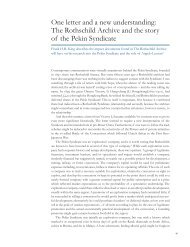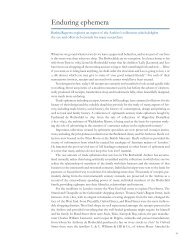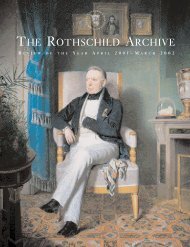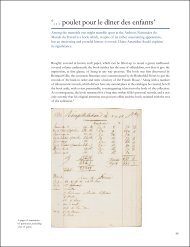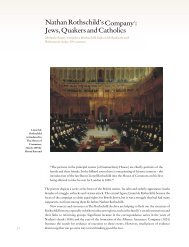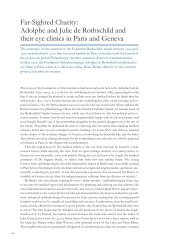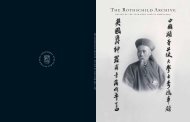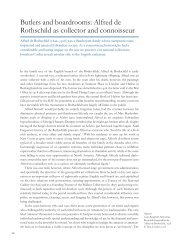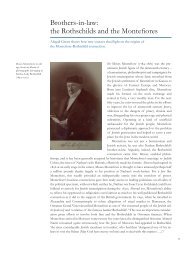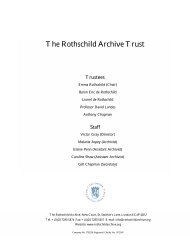66900 Rothschild Archive - The Rothschild Archive.
66900 Rothschild Archive - The Rothschild Archive.
66900 Rothschild Archive - The Rothschild Archive.
You also want an ePaper? Increase the reach of your titles
YUMPU automatically turns print PDFs into web optimized ePapers that Google loves.
‘<strong>The</strong> Lion’s Share’ from<br />
Punch in 1875, showing<br />
Prime Minster Benjamin<br />
Disraeli handing over to<br />
the Khedive some of the<br />
£4 million advanced to<br />
the British Government<br />
by Lionel de <strong>Rothschild</strong><br />
for the purchase of Suez<br />
Canal shares.<br />
they decided to take on such a complex and controversial operation. Nevertheless, an agreement<br />
was reached in 1878 for N.M. <strong>Rothschild</strong> & Sons in London and de <strong>Rothschild</strong> frères in<br />
Paris to issue the bond jointly and the bond was issued for sale to investors in February 1879.<br />
Almost immediately thereafter the files in the <strong>Archive</strong> record the torrent of protests, problems<br />
and complaints that the loan unleashed on the bank from every quarter. Many of the properties<br />
turned out to have prior mortgages, which were keenly defended in the courts of Cairo<br />
and Alexandria. Bondholders, who had purchased bonds issued for sale at 73 per cent of their<br />
nominal value, then demanded a refund at par (that is, at the full nominal value), claiming that<br />
there was insufficient security for the loan. Acting on the advice of their lawyers, the bank withheld<br />
the proceeds of the bond issue from the government until the status of the mortgages<br />
could be established. Funds were not released until November 1879, causing angry and agonised<br />
letters from Rivers Wilson, desperate to meet the demands of Egypt’s other creditors. In<br />
the event the London bank advanced him £1,225,000 to keep the government afloat.<br />
This loan, on the evidence of the files, seems far removed from the calm, measured routine<br />
demonstrated in most of the surviving documentation for the bank’s other nineteenth century<br />
bond issues. It is indeed hard to imagine another <strong>Rothschild</strong> loan that would have suggested<br />
itself as suitable content for a rather unfortunate letter of condolence written upon Lionel’s<br />
death in June 1879:<br />
L’emprunt Egyptien est une des dernières affaires qu’il ait faites; espérons que ce ne sera<br />
pas la pire.³<br />
After Lionel’s death his eldest son Nathaniel took up the baton, with Nathaniel’s brother Alfred<br />
later becoming involved in some of the diplomatic manoeuvrings which Egyptian finances<br />
stirred up between the ‘great powers’. Indeed, Rivers Wilson became a frequent guest at Alfred’s<br />
lavish weekend house parties at his Halton estate. But by far the biggest headache that the bank<br />
would have to face lay in the administration of the domains themselves.<br />
To provide reassurance to the bondholders the state domains were put under the control<br />
of three commissioners, nominated by the governments of Egypt, Britain and France. <strong>The</strong><br />
London bank established their relationship with the British commissioner Francis Rowsell, the<br />
erstwhile Superintendent of Naval Contracts for the British Admiralty, before he sailed for<br />
Egypt. Rowsell’s regular correspondence back to the bank brings fascinating and vibrant detail<br />
to the history of European involvement in Egypt. It is also a fine example of the quality of the<br />
<strong>Rothschild</strong> network of correspondents. <strong>The</strong> subtle triangulation of information sources contributed<br />
to that quality: not only did they receive regular information from Rowsell, but de<br />
35




